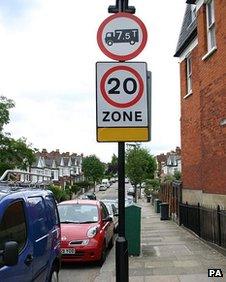Lib Dem conference: Call for more 20mph speed limit zones
- Published

Campaigners say lower speed limits are popular where they are in place
English councils should "actively consider" introducing a maximum 20mph speed limit in all residential roads, Liberal Democrat members have urged.
Activists supported plans to move towards 20mph limits on residential streets "over the next few years".
But they rejected a call for a mandatory change to be implemented over the next decade.
The vote is not binding on the government although the party wants it to influence policy.
If a motion put forward by Sarah Osborne, a councillor in Lewes, had been adopted, the switch to 20mph would have been phased in over 10 years, with 10% of roads changed to the lower speed limit every year. But this was amended.
'Safety lottery'
Ms Osborne told the annual conference in Brighton there were more than 600 fatalities and 12,000 serious injuries each year on 30mph roads - more than half of the overall total.
"Getting safely to school or the shops should not be a lottery," she said. "Every child deserves a safe route to school."
She said there was "compelling evidence" that the switch to 20mph would reduce fatalities and injuries and there was strong public support for the move.
"It is hard to find anyone in a 20mph area who wants it put back to 30mph," she told the conference.
'Flawed'
Residential areas in Brighton and other cities such as Oxford, Bath and Portsmouth with 20mph zones had proved popular and "made roads safer".
Campaigners say there are also secondary benefits such as reduced congestion and emissions and that the cost of changing street signs is small compared with the benefit of fewer lost lives.
Chris White, a councillor from St Albans, said a child hit by a car travelling at 20mph was likely to survive but not at 30mph.
Speeding in residential areas was still "socially acceptable", he added, and attitudes had to be challenged.
But party members approved an amendment, agreeing the process should be driven by local councils, not central government, and should not be mandatory.
Tim Ward, a councillor from Cambridge, said he wanted local authorities not civil servants in Whitehall deciding speed limits as the Lib Dems were "not the party of centrally dictated targets".
Mark Valladares, a Lib Dem councillor from Bury St Edmunds, said without local input the plan would be "well-meaning but flawed".
"It imposes one solution on councils regardless of their size, regardless of their circumstances, regardless of their needs."
The Lib Dem conference continues until Wednesday.